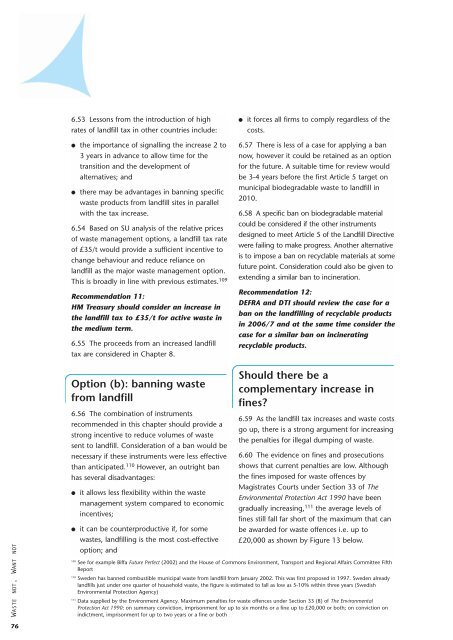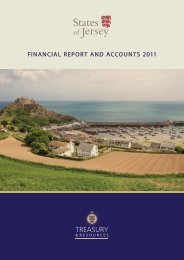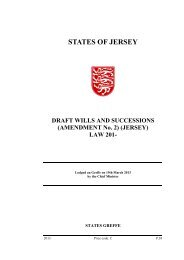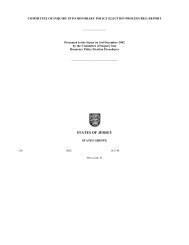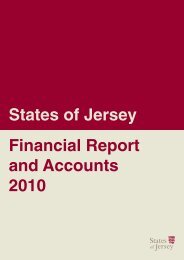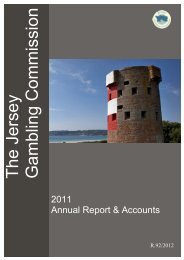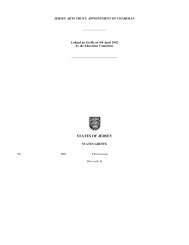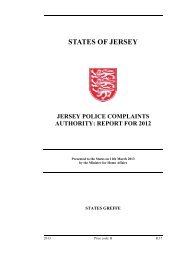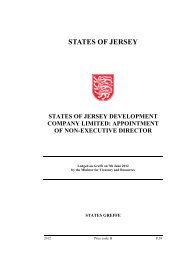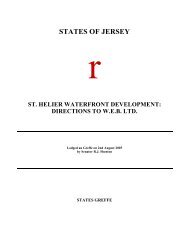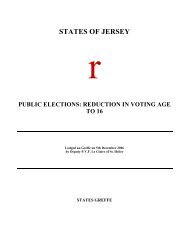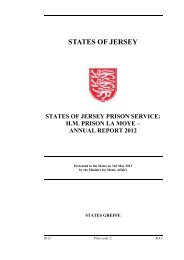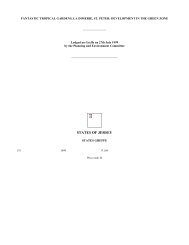Waste not want not - States Assembly
Waste not want not - States Assembly
Waste not want not - States Assembly
You also want an ePaper? Increase the reach of your titles
YUMPU automatically turns print PDFs into web optimized ePapers that Google loves.
6.53 Lessons from the introduction of high<br />
rates of landfill tax in other countries include:<br />
●<br />
it forces all firms to comply regardless of the<br />
costs.<br />
●<br />
●<br />
the importance of signalling the increase 2 to<br />
3 years in advance to allow time for the<br />
transition and the development of<br />
alternatives; and<br />
there may be advantages in banning specific<br />
waste products from landfill sites in parallel<br />
with the tax increase.<br />
6.54 Based on SU analysis of the relative prices<br />
of waste management options, a landfill tax rate<br />
of £35/t would provide a sufficient incentive to<br />
change behaviour and reduce reliance on<br />
landfill as the major waste management option.<br />
This is broadly in line with previous estimates. 109<br />
Recommendation 11:<br />
HM Treasury should consider an increase in<br />
the landfill tax to £35/t for active waste in<br />
the medium term.<br />
6.55 The proceeds from an increased landfill<br />
tax are considered in Chapter 8.<br />
6.57 There is less of a case for applying a ban<br />
now, however it could be retained as an option<br />
for the future. A suitable time for review would<br />
be 3-4 years before the first Article 5 target on<br />
municipal biodegradable waste to landfill in<br />
2010.<br />
6.58 A specific ban on biodegradable material<br />
could be considered if the other instruments<br />
designed to meet Article 5 of the Landfill Directive<br />
were failing to make progress. A<strong>not</strong>her alternative<br />
is to impose a ban on recyclable materials at some<br />
future point. Consideration could also be given to<br />
extending a similar ban to incineration.<br />
Recommendation 12:<br />
DEFRA and DTI should review the case for a<br />
ban on the landfilling of recyclable products<br />
in 2006/7 and at the same time consider the<br />
case for a similar ban on incinerating<br />
recyclable products.<br />
WASTE NOT, WANT NOT<br />
Option (b): banning waste<br />
from landfill<br />
6.56 The combination of instruments<br />
recommended in this chapter should provide a<br />
strong incentive to reduce volumes of waste<br />
sent to landfill. Consideration of a ban would be<br />
necessary if these instruments were less effective<br />
than anticipated. 110 However, an outright ban<br />
has several disadvantages:<br />
●<br />
●<br />
it allows less flexibility within the waste<br />
management system compared to economic<br />
incentives;<br />
it can be counterproductive if, for some<br />
wastes, landfilling is the most cost-effective<br />
option; and<br />
Should there be a<br />
complementary increase in<br />
fines?<br />
6.59 As the landfill tax increases and waste costs<br />
go up, there is a strong argument for increasing<br />
the penalties for illegal dumping of waste.<br />
6.60 The evidence on fines and prosecutions<br />
shows that current penalties are low. Although<br />
the fines imposed for waste offences by<br />
Magistrates Courts under Section 33 of The<br />
Environmental Protection Act 1990 have been<br />
gradually increasing, 111 the average levels of<br />
fines still fall far short of the maximum that can<br />
be awarded for waste offences i.e. up to<br />
£20,000 as shown by Figure 13 below.<br />
109<br />
See for example Biffa Future Perfect (2002) and the House of Commons Environment, Transport and Regional Affairs Committee Fifth<br />
Report<br />
110<br />
Sweden has banned combustible municipal waste from landfill from January 2002. This was first proposed in 1997. Sweden already<br />
landfills just under one quarter of household waste, the figure is estimated to fall as low as 5-10% within three years (Swedish<br />
Environmental Protection Agency)<br />
111<br />
Data supplied by the Environment Agency. Maximum penalties for waste offences under Section 33 (8) of The Environmental<br />
Protection Act 1990: on summary conviction, imprisonment for up to six months or a fine up to £20,000 or both; on conviction on<br />
indictment, imprisonment for up to two years or a fine or both<br />
76


